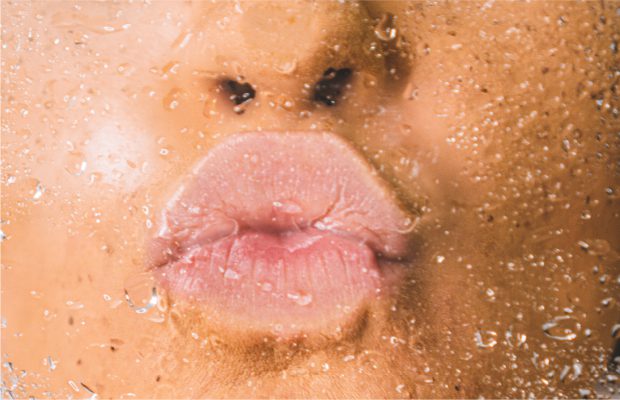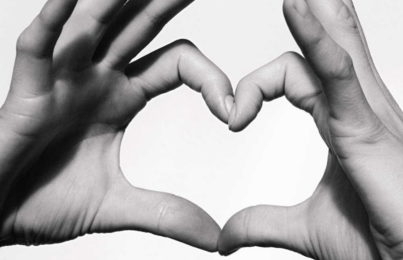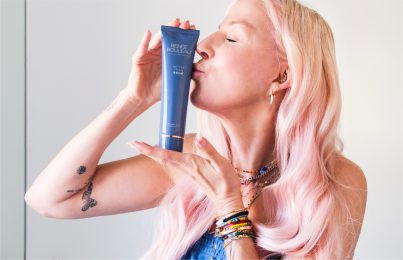Updated 01/12/25. If at any point during this winter, you’ve used the words “dry,” “chapped,” or “sore” to describe your lips, I feel your pain. I’m someone who always needs has lip balm on. This is despite living in Austin, Texas, where the temperatures rarely dip below 45 degrees this time of year! However, I’ve also lived in Minnesota, Wisconsin, and Boston, so I know all too well how difficult it can be to keep your lips smooth, plump, and hydrated once the freezing temperatures hit. It’s difficult, but not impossible. (This Clinique lip balm is my absolute favorite — and trust me, I’ve tried them all!)
- Why Do My Lips Get So Chapped in the Winter?
- How Can I Fix and/or Prevent Chapped Lips This Winter?
- 1. Don’t Lick Your Lips
- 2. Buffer The Area Around Your Lips Before Applying Any Active Ingredients
- 3. Don’t Chemically Exfoliate Your Lips
- 4. Instead, Exfoliate Your Lips With a Gentle Scrub or Soft Washcloth
- 5. Check Your Lip Products for Potential Irritants
- 6. Use a Lip Balm That Contains Occlusive Ingredients
- 7. Protect Your Lips With SPF
- 8. Sleep With a Humidifier
In this post, I’ll share 8 ways you can fix and/or prevent chapped lips this winter.
Why Do My Lips Get So Chapped in the Winter?
Before I get into prevention techniques and remedies for chapped lips, let’s talk about why your lips tend to get chapped in the first place. The fact of the matter is that cold air doesn’t retain humidity very well. So, it will pull moisture from the surrounding environment to compensate. This means that your lips tend to lose moisture faster than they can replenish it (and the same goes for the rest of your skin, too).
Add in the fact that the lips have a thinner moisture barrier compared to the rest of the skin and they don’t contain any oil glands to secrete natural moisture, and you have the perfect recipe for sore, cracked lips. Ouch.
How Can I Fix and/or Prevent Chapped Lips This Winter?
1. Don’t Lick Your Lips
This one is easier said than done, but there are some really compelling reasons why you should avoid doing this. Remember how cold air tends to steal moisture from the surrounding environment? Well, licking your lips basically makes them a magnet for this, as the constant wet-dry cycle disrupts the skin’s natural barrier.
And since saliva is technically an irritant thanks to the digestive enzymes it contains, it can also break down the lips’ barrier and cause cracking. Trust me, you’re not doing yourself any favors! This is one of the best things you can do to prevent chapped lips. But…if you have a good, protective lip balm on, then it’s harder for the saliva to get into the skin.
2. Buffer The Area Around Your Lips Before Applying Any Active Ingredients
Whether you’re using exfoliating acids, retinol, or a prescription retinoid, these ingredients are very active, which means they can exacerbate dryness around the sensitive lip area. The solution? Try buffering the lip area before applying them. All you have to do is apply a thick lip balm before the active ingredients. You can also apply a thin layer of moisturizer around your mouth to dilute the effects of active ingredients on this thin-skinned area.
3. Don’t Chemically Exfoliate Your Lips
Whether you buffer them or not, you shouldn’t use exfoliating acids directly on your lips. While it’s true that when your skin is feeling dry, using exfoliating acids (responsibly) can remove dead skin cell buildup and facilitate hydration, doing this on your lips can actually cause more problems. As I already mentioned, your lips are delicate; they don’t have much of a barrier and the skin is much thinner than that on other areas of your face. For this reason, I don’t recommend ever using exfoliating acids on your lips.
4. Instead, Exfoliate Your Lips With a Gentle Scrub or Soft Washcloth
If you’re dealing with flakiness, try using a soft washcloth or gentle scrub (like Triple Berry Smoothing Scrub) with barrier-repairing oils. These are safe ways to slough off the buildup of dead skin so your lip balm can moisturize more effectively. Just be sure to follow with a well-formulated lip balm to seal that hydration into the lips.
Many store-bought scrubs contain essential oils, fragrances, and other potential irritants, so why not make your own? Mix white or brown sugar with jojoba or sweet almond oil. Both are readily available, and neither have a strong scent. For even more hydration, you can try adding in a little honey. (Here’s a full list of barrier-repairing oils.)
5. Check Your Lip Products for Potential Irritants
Remember how I said you should avoid potential irritants in your lip scrubs? The same goes for cosmetic lip products (like lip glosses and lipsticks) and standard lip balms, too. Avoid using lipsticks that leave your lips feeling dry or plumping products that cause a tingling sensation. This sensation is actually a sign of irritation, so it’s definitely something you should try to avoid in the quest to fix and/or prevent chapped lips. Some potential irritants to look out for in these types of products include menthol, camphor, peppermint, fragrance, and essential oils. (Burt’s Bees has a popular peppermint lip balm and I find it to be so drying!)
6. Use a Lip Balm That Contains Occlusive Ingredients
You’ve probably heard that ingredients like hyaluronic acid, sodium hyaluronate, and glycerin are great for hydrating the skin. This is true, but there’s a caveat—if you apply them in a dry environment without sealing them in with occlusive ingredients, they can actually end up drying out your skin even more.
Let me explain. Hyaluronic acid, sodium hyaluronate, glycerin, and (as I already mentioned) sugar, belong to a class of ingredients called humectants. They work by attracting water from the air to the skin. But if there’s no water in the air for them to attract, they’ll start to pull it from the deeper layers of the skin, which actually dries it out. That’s why it’s important to use a lip balm that contains occlusive ingredients. These ingredients create a seal or barrier over the skin to keep hydration locked in. Some examples of occlusive ingredients to look for are shea butter, beeswax, petrolatum, mineral oil, dimethicone, and lanolin.
7. Protect Your Lips With SPF
Your lips contain fewer melanocytes (melanin-producing cells) than the rest of your skin, which makes them more susceptible to UV damage. A lot of people overlook using SPF on their lips, but it’s an important step because it protects them against skin cancer and prevents the breakdown of collagen (which is what keeps our lips looking nice and plump). I suggest looking for a lip balm with a minimum of SPF 20 and reapplying it often throughout the day. This is even more important if you’re into winter sports, like skiing, and you’re consistently exposed to UV rays.
8. Sleep With a Humidifier
Keeping a humidifier in your bedroom can help address one of the root causes of chapped lips in the winter—dry air. By doing this, you won’t have to start at square one each morning, making up for lost hydration. This tip is especially helpful if you sleep in a house with central heating since this really zaps moisture from the air.
Next, learn how to fix eight of winter’s most annoying skin issues!
Celebrity Esthetician & Skincare Expert
As an esthetician trained in cosmetic chemistry, Renée Rouleau has spent 30 years researching skin, educating her audience, and building an award-winning line of products. Her hands-on experience as an esthetician and trusted skin care expert has created a real-world solution — products that are formulated for nine different types of skin so your face will get exactly what it needs to look and feel its best. Trusted by celebrities, editors, bloggers, and skincare obsessives around the globe, her vast real-world knowledge and constant research are why Marie Claire calls her “the most passionate skin practitioner we know.”




Comments:
I suffer from constant dry lips as a result of Accutane. I just want to say that Nuxe Reve De Miel is the only lip balm I will ever use. In the winder, I also add hyaluronic acid and Squalane to my lips then seal it in with the balm.
I’ve always wondered if urea might be helpful for dry lips since it has mild exfoliation properties but its also extremely moisturizing. Would love to know your thoughts on this Renée!
Posted By: Rosie |
I love that you’re reaching out to us as a trusted source for skincare knowledge! Unfortunately, as you can surely understand, we do not make it a habit to comment on other companies’ skincare lines. Since we do not know how they formulate or where they source ingredients from, I can not make an accurate judgment on this product.
Posted By: Renée Rouleau |
Thanks for this! I consistently struggle with dry lips. Also, thanks for letting us know not to chemically exfoliate our lips. Not too long ago I read an article where chemical exfoliation was suggested and have actually tried it a few times.
Posted By: Shari |